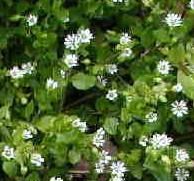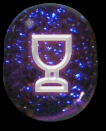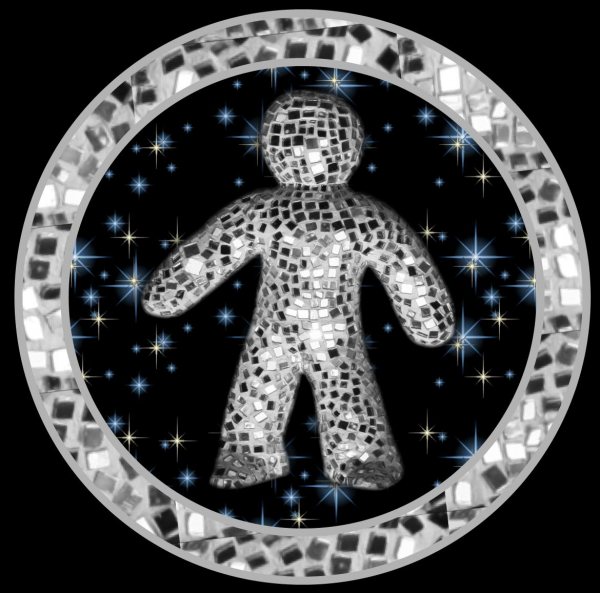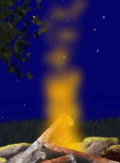Chickweed
Chickweed—called Alsine or Stellaria media, a floral star of middle magnitude—belongs to the Clove-pink order of plants, and, despite the most severe weather, grows with us all the year round, in waste places by the roadsides, and as a garden weed. It is easily known by its fresh-looking, juicy, verdant little leaves, and by its tiny white star-like flowers; also by a line of small stiff hairs, which runs up one side of the stalk like a vegetable hog-mane, and when it reaches a pair of leaves immediately shifts its position, and runs up higher on the opposite side.
The fact of our finding Chickweed (and Groundsel) in England, as well as on the mainland of Europe, affords a proof that Britain, when repeopled after the great Ice age, must have been united somewhere to the continent; and its having lasted from earliest times throughout Europe, North America, and Siberia, seems to show that this modest plant must be possessed of some universal utility which has enabled it to hold its own until now in the great evolutionary struggle. It grows wild allover the earth, and serves as food for small birds, such as finches, linnets, and other feathered songsters of the woods. Moreover, we read in the old herbal of Turner: Qui alunt aviculas caveis inclusas hoc solent illas si quando cibos fastigiant recreare—or, as Gerard translates this: "Little birds in cages are refreshed with Chickweed when they loath their meat."
The Chickweed is termed Alsine—quia lucos, vel alsous amat— because it loves to grow in shady places
This small herb abounds with the earthy salts of potash, which are admirable against scurvy when thus found in nature's laboratory, and a continued deprivation from which always proves disastrous to mankind.
"The water of Chickweed," says an old writer, "is given to children for their fits, and its juice is used for their gripes." When boiled, the plant may be eaten instead of Spinach. Its fresh juice if rubbed on warts, first pared to the quick, will presently cause them to fall off.
Fresh Chickweed juice, as proved medicinally in 1893, produced sharp rheumatic pains and stitches in the head and eyes, with a general feeling of being bruised; also pressure about the liver and soreness there, with sensations of burning, and of bilious indigestion.
Subsequently, the chickweed herb, when given in quite small doses of tincture, or fresh juice, or infusion, has been found by its affinity to remove the train of symptoms just described, and to act most reliably in curing obstinate rheumatism allied therewith.
Furthermore, a poultice prepared from the fresh green juicy leaves, is emollient and cooling, whilst an ointment made from them with hog's lard, is manifestly healing.
When rain is impending, the flowers remain closed; and the plant teaches an exemplary matrimonial lesson, seeing that at night its leaves approach one another in loving pairs, and sleep with the tender buds protected between them. Culpeper says: "Chickweed is a fine, soft, pleasing herb, under the dominion of the moon, and good for many things." Parkinson orders thus: "To make a salve fit to heal sore legs, boil a handful of Chickweed with a handful of red rose leaves in a pint of the oil of trotters or sheep's feet, and anoint the grieved places therewith against a fire each evening and morning; then bind some of the herb, if ye will, to the sore, and so shall ye find help, if God will."
Added Jun 19, 2010
| 6,190 Reads






















